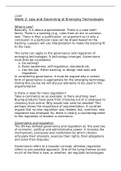College aantekeningen
Class notes on Law and Governance Of Emerging Technologies (R_GRET)
- Instelling
- Vrije Universiteit Amsterdam (VU)
Summary of lecture 2. Introduces critical questions regarding the governance of emerging technologies. What are the legal concerns? What, Why, and How should emerging technologies be governed? At what level? EU? National? Notes provide insight on these questions.
[Meer zien]




